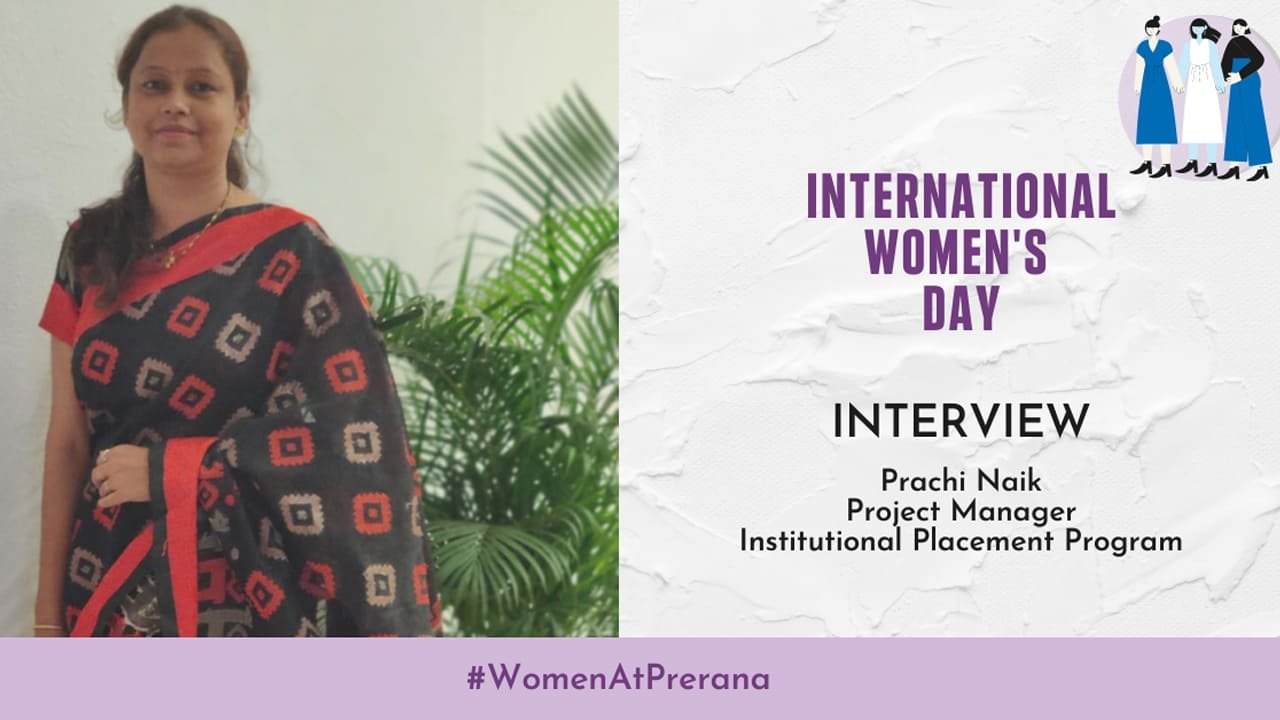Apurva Vurity
COMMUNICATIONS MANAGER
This International Women’s Day, we want to appreciate and celebrate our #WomenAtPrerana. In this interview, Prachi Naik, our Project Manager of the Institutional Placement Program shares about her journey in Prerana for the past 15 years, the challenges she faced in the program and her thoughts on building her own identity as a woman.
What is your personal story? How did you reach the leadership position that you have?
When I was younger, I was always interested in social work so my parents encouraged me to follow this field professionally. Their faith gave me confidence and I decided to pursue my Master’s in Social Work from SNDT University. Sharing the journey of my personal growth is impossible without speaking about the invaluable support and encouragement that my family provided.
During the last year of my post-graduation, I got married into another supportive family. Around that time, Prerana was conducting walk-in interviews and I decided to go for it. I came to the Kamathipura office and spoke to Priti Tai. She was kind to me and the entire meeting was more of a conversation than an interview. She told me about the Red Light Area and the kind of work that might come my way. I had always wondered about the women in the Red Light Areas when my bus used to cross that area but never in my life did I think that I would get an opportunity to work with them. I decided to take up the role after consulting with my family who were very encouraging. Since that day, I have not looked back. I joined Prerana as a Project Coordinator in 2006 for the Educational Support Program. I have faced some challenging times during the course of my work. Sometimes these challenges were work related but a lot of times they were personal. Irrespective of the nature of these challenges Prerana has always been there with me.
There are some instances in my journey at Prerana that I can never forget because they shaped the trajectory of my life. One such instance was in 2010 when I had to take maternity leave so I decided to leave the organization. I still remember that even when I was at home, I used to think about the children I worked with. One day I unexpectedly got invited to Balak Utsav that Prerana organizes every year. Even though I had left the organization, the team reached out to me and wanted me to be there to see our children perform. I was very touched and that event made me realize that I cannot and did not want to stop working.
Since then, I changed roles, worked in new projects, worked with new people and continued learning a lot from Prerana and the people at Prerana. Currently, I work as the Project Manager in the Institutional Placement Program (IPP). If I have to reflect about my personal growth, I think the Prachi that I am today is because of all the experiences I had while working in this organization. I worked very hard and I am proud to say that today the organization trusts me because of my contribution to the cause. That trust means everything to me. I want to actively take this project forward and not wonder about these children while I sit at home.
You worked with Prerana for 15 years. What have been your personal achievements within the organization?
One of my biggest achievements in this organization has been to learn the art of communication. I was a keen observer and most of my learnings have come from observing other people. I used to accompany my team members, managers and Priti Tai for meetings, visits, seminars and conferences. It was at these places that I learnt the most – not from others but from my own colleagues. I observed them interacting sensitively and responsibly with all our partners and stakeholders. The other reason why my communication skills improved was because of working in the Institutional Placement Program. This program demands interpersonal communication skills because we are always on the field interacting with different kind of people. Besides getting better at communicating, I am proud of myself for being able to plan and take prompt decisions. Earlier, I used to consult, seek advice and sometimes hesitate to take the next step. Today I am quicker and confident with my decision making.
But, keeping all these personal wins aside, I think my biggest achievement is when the children we work with appreciate us. Once, a woman, whom we worked with when she was a child, refused to get married to her partner without Prerana’s presence in the function. I felt emotional and contented when I attended her marriage and saw how far she had come and the woman she had evolved into. There is nothing that can be compared to the feeling of hearing children appreciate Prerana’s contribution in their journey.
What has been the most challenging experience for you while doing your work?
In 2015, I fell sick unexpectedly. At that time, I had been working very hard with my team members to strengthen the Institutional Placement Program. We had been progressing steadily and the future of the program and the children associated with us looked bright. But then I fell sick for almost 2 months and was on complete bed rest. This meant that I was unable to visit the children whom I had spent so much time building a good rapport with. I was worried that my health will cause a setback in my work. This was a very challenging time for me because at that time we did not have a big team in the program and a lot of activities were being led by me. Children called up Prerana asking why I was not visiting them and how much they missed my visits. I felt like I had deserted them suddenly. It was even more challenging to come back to work after 2 months, catch up with my pending work with renewed sincerity and vigour. The organization’s leadership team stepped in and helped me plan the program better. Together, we hired more team members so that we could bring the project back on track. Look at the program today! It would have never been at this stage if we had not worked collectively to mitigate all the challenges that we faced in the past.
How did COVID-19 affect your work and were there any challenges that you faced because you were a woman working during the pandemic?
With the sudden lockdown, we had to plan how to manage the entire project from home – something that we didn’t think we would ever need to do. Our work is completely based in the field because we have to conduct visits and ensure the well-being of our children. The first thing we did was to send an email to all stakeholders to let them know that we are working during the pandemic. We asked them to keep in touch with us over the phone. The biggest challenge was with the children because when we visit children in CCIs, we get attached to them. For some children whose parents are unable to visit them, we become the representative care takers so their emotional dependence on us is higher. Keeping all of this in mind, it was crucial for us to continue staying in touch so we made sure that we did that.
It can definitely be burdensome if you are a woman working from home. When we work from the office, we leave behind all our duties and responsibilities related to the household back at home. But during work from home, these boundaries were challenged. My child was happy that his mother was at home but he did not understand that I would not be able to devote time to him during working hours. My family members also had the expectation that since I was at home, I would be more present and more involved but that was again very difficult for me. I had to set boundaries and expectations to ensure that my work did not get hampered.
During the later months of the lockdown, I started going on field for relief activities. My husband also accompanied me to help. When women used to thank him during the distribution, I could see him getting emotional. He really started appreciating my work even more. He felt proud that I do such good work.
What is the best way that women can support other women to grow?
One of the most important things that women forget is to take care of themselves. Self-care should be prioritized in the lives of women and more so in the lives of women who are social workers because they are expected to take care of their clients too. The best way to support other women is to encourage them to take care of themselves over everything else. I learnt self-care from Prerana but now it is an important part of my entire life.
Professionally, I think women should work with other women on the basis of their strengths and weaknesses. Everyone is good at something and is relatively weaker at something else. If we are able to identify the strengths and weaknesses of each individual professionally, then women can support other women to get better at what they wish to improve on.
On International Women’s Day, we want to ask you what you think is one of the most important steps to take for the goal of gender equality?
Every year, we must remember that women continue to face a lot more challenges than their male counterparts. This means that women should be supported and encouraged more so that they get the much-needed thrust to further their careers and their lives. In my house, my husband is very supportive so that gives me the space to be able to work hard at my job. We both collectively question gender roles and responsibilities. He never thinks of any work as not his. We divide our labour at home and at work so that he can contribute equally. The key to move towards gender equality definitely lies within our own households. If families appreciated all the labour that women put in within their houses, we would reach the goal of equality faster. Work is work – whether it is inside the house or outside. If families can respect men for the work they do outside, they should learn to respect women for the work they do inside the house. Lastly, I think women should focus on building their own identity. I want to be recognised for being the individual that I am. I want everyone to know me as Prachi and not only as someone’s wife.





